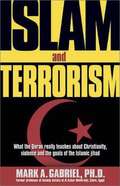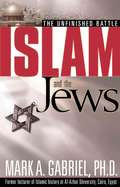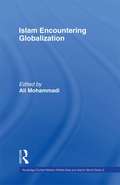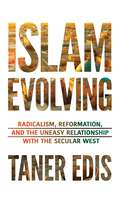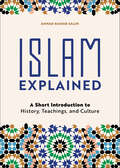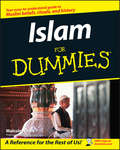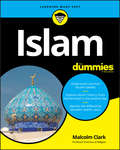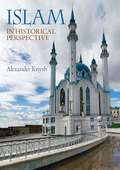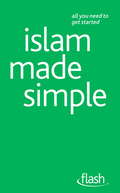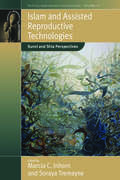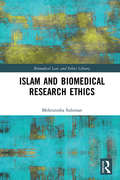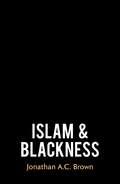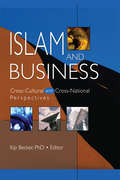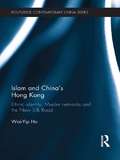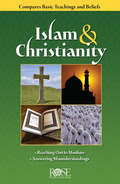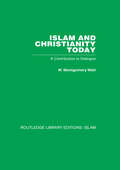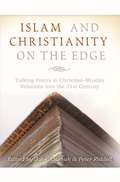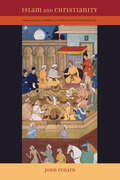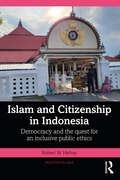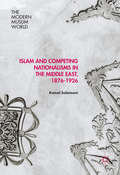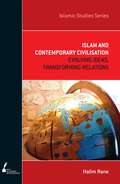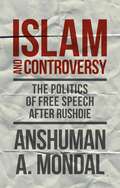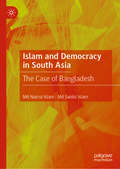- Table View
- List View
Islam And Terrorism
by Mark A. GabrielDr. Mark Gabriel, clearly documents the identification between modern terrorism and Islamic theology. He also explains his journey to Christian faith
Islam And The Jews: The unfinished battle
by Mark A GabrielWhat fuels the conflict? There are powerful cultural and spiritual forces that explain… •Why Palestinians reject peace offers •Why radical Muslims attach Israel&’s supporters, especially Americans •The role of Christians in unfolding world events •Why, if Islam is a religion of peace, Muslims kill Jews in the name of Allah, their god Why the Quran calls Jews &“the children of monkeys and pigs&”&“I didn&’t just do research about Islam; I lived if for thirty-four years!&” -Mark Gabriel &“Dr. Gabriels transformation from devout Muslim is a powerful reminder of how love can indeed conquer hate. His bold change of heart prompts him to bless the Jewish people rather than curse and hate them.&” -Rabbi Yechiel Eckstein &“Islam and the Jews reveals the secret agenda that is not being told by the media. I wish U.S. government officials would read this book.&” -Sid Roth, President, Messianic Vision
Islam Encountering Globalisation (Durham Modern Middle East and Islamic World Series #Vol. 2)
by Ali MohammadiOne of the greatest dilemmas facing Muslims today is the fact that Muslim culture is often seemingly incompatible with the culture of the modern Western world, and the features associated with it - technological progress, consumerism, and new electronic communication, all of which have the potential for a homogenizing effect on any culture. This book explores many key aspects of the globalisation process, discussing how Muslim countries are coping with globalisation, as well as considering how the West is responding to Islam.
Islam Evolving: Radicalism, Reformation, and the Uneasy Relationship with the Secular West
by Taner EdisHow is Islam adapting to the rapid changes of the 21st century? Despite political unrest and terrorism, the author argues that many Muslim societies are successfully developing their own versions of modern life. In contrast to the secular liberal model that prevails in the West, Islam is demonstrating alternative ways to be modern while maintaining a distinctly Muslim worldview. Professor Edis, an American physicist with a secular viewpoint who was raised in Turkey, is uniquely qualified to evaluate the interplay of modern trends and Islamic values. He devotes separate chapters to prominent examples of what he calls Islam's "pious modernity." For instance, while most Muslim societies embrace the applied sciences and technology, they are cooler toward aspects of science with materialist implications. They are also enthusiastically adopting a market economy and consumerism, while preserving Muslim religious values. Even in such controversial areas as multiculturalism, individual human rights, freedom of speech, and gender roles, the author shows that Muslim societies are drawn toward a flexible conservatism. He critically evaluates attempts to import Western political and cultural notions into Muslim societies and draws interesting parallels between conservative Christian reactions to secular society and similar responses in Islam. This balanced overview of Islam's relationship with the modern world will be of interest to open-minded readers in both the West and the East.
Islam Explained: A Short Introduction to History, Teachings, and Culture
by Ahmad Rashid SalimA revealing guide to understanding the principles of IslamWith more than 1.8 billion followers worldwide, Islam is one of the world's largest religions, but it is also one that is poorly understood by many Americans. Islam Explained offers an informative overview of the faith, helping those who are new to Islam foster cultural awareness while also providing those already familiar with it the opportunity to deepen their understanding.Whether you are looking to expand your own knowledge of Islam or just better understand the practices of Muslim friends, coworkers, and neighbors, this concise and essential guide provides a solid foundation for future study and conversation.Islam Explained features:Easy-to-understand explanations—This book provides a complete overview ideal for those who are interested in Islam as a faith, a subject of study, and beyond.Historical contexts—Better understand the history of Islam, how the religion has evolved, and the ways that history has shaped the lives of Muslims.Beliefs and practices—Explore what it means to be a practicing Muslim, including the Five Pillars, laws, dress codes, and brief glimpses into how they vary between individual sects.Take yourself on a journey that will end in a better, more complete understanding of Islam.
Islam For Dummies
by Malcolm ClarkMany non-Muslims have no idea that Muslims worship the same God as Christians and Jews, and that Islam preaches compassion, charity, humility, and the brotherhood of man. And the similarities don't end there. According to Islamic teaching, Muhammad founded Islam in 610 CE after the angel Gabriel appeared to him at Mecca and told him that God had entered him among the ranks of such great biblical prophets as Abraham, Moses, and Christ. Whether you live or work alongside Muslims and want to relate to them better, or you simply want to gain a better understanding of the world's second largest religion, Islam For Dummies can help you make sense of this religion and its appeal. From the Qur'an to Ramadan, this friendly guide introduces you to the origins, practices and beliefs of Islam, including: Muhammad, the man and the legend The Five Pillars of Wisdom The Five Essentials beliefs of Islam The different branches of Islam and Islamic sects The Qur'an and Islamic law Islam throughout history and its impact around the world Professor Malcolm Clark explores the roots of Islam, how it has developed over the centuries, and it's long and complex relationship with Christianity. He helps puts Islam in perspective as a major cultural and geopolitical force. And he provided helpful insights into, among other things: Muhammad, the Qur'an and the ethical teachings of Islam Muslim worship, customs, and rituals surrounding birth, marriage, and death Shi'ites, Sunnis, Sufis, Druze, and other important Muslim groups Islam in relation to Judaism and Christianity In these troubled times, it is important that we try to understand the belief systems of others, for through understanding comes peace. Islam For Dummies helps you build bridges of understanding between you and your neighbors in the global village.
Islam For Dummies (For Dummies)
by Malcolm ClarkMany non-Muslims have no idea that Muslims worship the same God as Christians and Jews, and that Islam preaches compassion, charity, humility, and the brotherhood of man. And the similarities don’t end there. According to Islamic teaching, Muhammad founded Islam in 610 CE after the angel Gabriel appeared to him at Mecca and told him that God had entered him among the ranks of such great biblical prophets as Abraham, Moses, and Christ. Whether you live or work alongside Muslims and want to relate to them better, or you simply want to gain a better understanding of the world’s second largest religion, Islam For Dummies can help you make sense of this religion and its appeal. From the Qur’an to Ramadan, this friendly guide introduces you to the origins, practices and beliefs of Islam, including: Muhammad, the man and the legend The Five Pillars of Wisdom The Five Essentials beliefs of Islam The different branches of Islam and Islamic sects The Qur’an and Islamic law Islam throughout history and its impact around the world Professor Malcolm Clark explores the roots of Islam, how it has developed over the centuries, and it’s long and complex relationship with Christianity. He helps puts Islam in perspective as a major cultural and geopolitical force. And he provided helpful insights into, among other things: Muhammad, the Qur’an and the ethical teachings of Islam Muslim worship, customs, and rituals surrounding birth, marriage, and death Shi’ites, Sunnis, Sufis, Druze, and other important Muslim groups Islam in relation to Judaism and Christianity In these troubled times, it is important that we try to understand the belief systems of others, for through understanding comes peace. Islam For Dummies helps you build bridges of understanding between you and your neighbors in the global village. Islam For Dummies (9781119642978) was previously published as Islam For Dummies (9780764555039). While this version features a new Dummies cover and design, the content is the same as the prior release and should not be considered a new or updated product.
Islam In Historical Perspective
by Alexander Sasha KnyshThis introductory text on the history of Islam adopts a "civilizational" approach to the subject that "views Islam as a progressive unfolding in space and time of a certain set of foundational ideas that manifest themselves in all spheres of the lives of its followers--from their socio political actions to theological and philosophical thought, to artistic self-expression. " He presents 25 chapters broadly organized by chronology and theme. They address the historical development of the religion and the development of key sects, universal and particular beliefs and practices in the religion, key movements and schools of debate within the religion, institutions of knowledge transmission, the status of women, art and architecture, the Islamic encounter with European colonialism, and Islam as a political force, among other topics, from its beginnings to the present. Annotation ©2011 Book News, Inc. , Portland, OR (booknews. com)
Islam Made Simple: Flash
by Ruqaiyyah Waris MaqsoodThe books in this bite-sized new series contain no complicated techniques or tricky materials, making them ideal for the busy, the time-pressured or the merely curious. Islam Made Simple is a short and to-the-point guide to Islam. In just 96 pages, the reader will learn all about the history, beliefs and traditions of this major world faith. Ideal for the busy, the time-pressured or the merely curious, Islam Made Simple is a quick, no-effort way to break into this fascinating topic.
Islam Revealed
by Anis A. ShorroshDr. Anis Shorrosh explains the driving force behind the fanatical, as well as the moderate and conservative, sects of Islam in ISLAM REVEALED. Drawing on his experience as a Palestinian-born Arab Christian and years of research and study, Dr. Shorrosh lays open the inner workings of an ever-growing religion that currently numbers its members at a staggering 900 million. Through comparisons of the Islam "bible", the Koran (Quran), with the Hebrew-Christian Bible, you will see the contradictions and inaccuracies that form the basis for the Muslims' beliefs. Also, the turbulent life of Islam's sixth-century prophet, Muhammad, is contrasted with the holy, virtuous life of Jesus. With world tensions continuing to explode in the Middle East, you'll depend on this timely reference to help you better understand the whys and hows of Islam.
Islam and Assisted Reproductive Technologies
by Marcia C. Inhorn Soraya TremayneHow and to what extent have Islamic legal scholars and Middle Eastern lawmakers, as well as Middle Eastern Muslim physicians and patients, grappled with the complex bioethical, legal, and social issues that are raised in the process of attempting to conceive life in the face of infertility? This path-breaking volume explores the influence of Islamic attitudes on Assisted Reproductive Technologies (ARTs) and reveals the variations in both the Islamic jurisprudence and the cultural responses to ARTs.
Islam and Biomedical Research Ethics (Biomedical Law and Ethics Library)
by Mehrunisha SulemanThis book is a contribution to the nascent discourse on global health and biomedical research ethics involving Muslim populations and Islamic contexts. It presents a rich sociological account about the ways in which debates and questions involving Islam within the biomedical research context are negotiated - a perspective which is currently lacking within the broader bioethics literature. The book tackles some key understudied areas including: role of faith in moral deliberations within biomedical research ethics, the moral anxiety and frustration experienced by researchers when having to negotiate multiple moral sources and how the marginalisation of women, the prejudice and abuse faced by groups such as sex workers and those from the LGBT community are encountered and negotiated in such contexts. The volume provides a valuable resource for researchers and scholars in this area by providing a systematic review of ethical guidelines and a rich case-based account of the ethical issues emerging in biomedical research in contexts where Islam and the religious moral commitments of Muslims are pertinent. The book will be essential for those conducting research in low and middle income countries that have significant Muslim populations and for those in Muslim-minority settings. It will also appeal to researchers and scholars in religious studies, social sciences, philosophy, anthropology and theology, as well as the fields of biomedical ethics, Islamic ethics and global health..
Islam and Biomedicine (Philosophy and Medicine #137)
by Afifi Al-Akiti Aasim I. PadelaThis book showcases multidisciplinary research at the intersection of the Islamic tradition and biomedicine. Within this broad area of scholarship, this book considers how Islamic theological constructs align with the science and practice of medicine, and in so doing offer resources for bridging the challenges of competing ontological visions, varied epistemic frameworks, and different theologies of life and living among the bodies of knowledge. By bringing together theologians, medical practitioners and intellectual historians, the book spurs deeper conversations at the intersection of these fields and provides fundamental resources for further dedicated research.
Islam and Blackness
by Jonathan A.C. BrownIt is commonly claimed that Islam is antiblack, even inherently bent on enslaving Black Africans. Western and African critics alike have contended that antiblack racism is in the faith&’s very scriptural foundations and its traditions of law, spirituality, and theology. But what is the basis for this accusation? Bestselling scholar Jonathan A.C. Brown examines Islamic scripture, law, Sufism, and history to comprehensively interrogate this claim and determine how and why it emerged. Locating its origins in conservative politics, modern Afrocentrism, and the old trope of Barbary enslavement, he explains how antiblackness arose in the Islamic world and became entangled with normative tradition. From the imagery of &‘blackened faces&’ in the Quran to Shariah assessments of Black women as &‘undesirable&’ and the assertion that Islam and Muslims are foreign to Africa, this work provides an in-depth study of the controversial knot that is Islam and Blackness, and identifies authoritative voices in Islam&’s past that are crucial for combatting antiblack racism today.
Islam and Business: Cross-Cultural and Cross-National Perspectives
by Kip BeckerKeep up with management issues in the rapidly changing Islamic business world! Islam and Business: Cross-Cultural and Cross-National Perspectives reviews important changes, cross-cultural differences, and management issues in the turbulent Islamic business environment. With the shift from government ownership of companies and commodities toward more open markets and the product/service diversification that this change brings, the need to understand how business is done in these countries is more vital than ever before. The research in this book will help you understand the impact of Westernization upon business practices in Islamic nations. With contributions from experts on four Islamic business environments (Turkey, Jordan, Egypt, and Lebanon), this book: provides a framework to guide corporations in policy and strategic planning examines the impact of Western reforms on selected Islamic business sectors discusses the training, leadership, and management development needs of companies doing business in or with Islamic nations Section 1: Business in Turkey presents: a framework for corporate policy making and for strategic planning activities an assessment of what can cause strategic alliances to succeed or to fail-illustrated by a case study of the relationship between Turkish Airlines and the Qualiflyer Group-this study considers the question in terms of goals, partner selection, alliance management, and areas of cooperation an examination of value-at-risk (VaR) models that can be used to compute market risk for financial institutions-with a study of crisis scenarios as applied to the four largest Turkish banks Section 2: Business in Jordan presents: a study of the impact Westernization has had on the efficiency of Jordanian commercial banks an examination of current practices and procedures for management training and development (MTD) needs in public and private organizations in Jordan-and suggestions for future improvements an exploratory study of how national and regional socio-cultural values affect organizational culture-considering such factors as Power Distance (PD), Uncertainty Avoidance (UA), the Individualism-Collectivism (IDV) dimension, and the Masculinity-Femininity (MAS) dimension, as well as power culture, role orientation, achievement culture, and the support-oriented organization Section 3: Business in Egypt and Lebanon presents: a comprehensive model of relationships between transactional and transformational leadership trust in terms of organizations, organizational justice, intention to leave, and organizational citizenship behavior-using data supplied by 179 middle and direct level managers in 17 private Egyptian organizations an analysis of the factors affecting the advancement of the Lebanese tourism industry, which has suffered tremendously in the wake of civil war and political unrest The information in Islam and Business will be helpful to anyone practicing management or studying how management works in the Islamic world. Make it a part of your professional/teaching collection today!
Islam and China's Hong Kong: Ethnic Identity, Muslim Networks and the New Silk Road (Routledge Contemporary China Series)
by Wai-Yip HoHong Kong is a global city-state under the sovereignty of the People’s Republic of China, and is home to around 250,000 Muslims practicing Islam. However existing studies of the Muslim-majority communities in Asia and the Northwest China largely ignore the Muslim community in Hong Kong. Islam and China’s Hong Kong skillfully fills this gap, and investigates how ethnic and Chinese-speaking Muslims negotiate their identities and the increasing public attention to Islam in Hong Kong. Examining a range of issues and challenges facing Muslims in Hong Kong, this book focuses on the three different diasporic Muslim communities and reveals the city-state’s triple Islamic heritage and distinctive Islamic culture. It begins with the transition from the colonial to the post-colonial era, and explores how this has impacted on the experiences of the Muslim diaspora, and the ways this shift has compelled the community to adapt to Chinese nationalism whilst forging greater links with the Gulf. Then with reference to the rise of new media and technology, the book examines the heightened presence of Islam in the Chinese public sphere, alongside the emergence of Chinese Islamic websites which have sought to balance transnational Muslim solidarity and sensitivity towards Chinese government’s concern of external extremism. Finally, it concludes by investigating Hong Kong’s growing awareness of the Muslim minorities’ demands for Islamic religious education, and how this links with the city-state’s aspiration to become the new gateway for Islamic finance. Indeed, Wai Yip Ho posits that Hong Kong is now shifting from its role as the broker that bridged East and West during the Cold War, to that of a new meditator between China and the Middle East. Drawing on extensive ethnographic research, this book thoughtfully charts a new area of inquiry, and as such will be welcomed by students and scholars of Chinese studies, Islamic studies, Asian studies and ethnicity studies.
Islam and Christianity
by Rose PublishingIslam & Christianity: Compares Basic Teachings and BeliefsIslam & Christianity is a short ebook that can be read in 30 minutes or less and compares the basic beliefs of Christians and Muslims (followers of Islamic faith) on eight different topics. Using an easy-to-follow format, this bestselling ebook helps believers understand the key differences between Muslims and Christian. It looks at key issues and asks, "What Muslims Believe," "What Christians Believe," and addresses "How to Correct Misunderstandings." With this knowledge, you can reach out to Muslim without offending cultural sensitivities. More than one billion people around the world follow the teachings of Muhammad and Islam. Islam & Christianity is an excellent tool for pastors, teachers and others who are interested in discovering the beliefs that Christians and Muslims have in common and those that are different. This tool will help pastors and leaders equip missions-minded believers to avoid common witnessing mistakes and to be more sensitive about sharing their faith with Muslims. Discover what Muslims have been taught about Christianity and how to answer their questions and concerns. The Islam & Christianity ebook addresses eight key areas: *Religious History *Who God is *The Holy Scriptures *Prophets *Practices and Rituals *Salvation and Paradise *The Role of Women *Religion and Culture Here are a few of the interesting facts that teachers and their students will encounter in studying Islam & Christianity: *Muslims believe Muhammad is the final prophet, but that Jesus was born of a virgin and lived a sinless life. *Many Muslims misunderstand the concept of the Trinity. * Some Muslims are worried that Western society will corrupt their children because of the images they see on TV and magazines.*Muslims are committed to the Five Pillars of religion. *In Islam, there is no savior; Allah is supreme. Islam & Christianity also provides this insightful and helpful information: *More than a dozen Do's and Don'ts of reaching out to Muslims, including: *Do make it clear you are a Christian *Don't argue *Do be sensitive to cultural manners: men should speak with men, women with women *When sitting don't point the sole of your shoe toward anyone. *Notes and additional references on Islam *A mini-glossary of 17 words that are key to connecting with and understanding Muslims
Islam and Christianity Today: A Contribution to Dialogue
by W M WattIn this volume, originally published in 1983, W Montgomery Watt looks at the meeting of Christianity and Islam, how they see and have seen each other, and considers how they can aid each other in dealing with the problems of the world today. He emphasizes those beliefs which Christianity and Islam have in common, and shows how they may be justified intellectually.
Islam and Christianity on the Edge: Talking Points in Christian-Muslim Relations into the 21st Century
by John Marks Caroline Cox John Azumah Bernie Power Michael Nazir-Ali Peter Cotterell Derek Tidball Peter Riddell Tony Lane Gordon Nickel Anthony O’mahony Sean Oliver-Dee Gerry Redman Keith Small Charlotte ThorneycroftThe relationship between Christianity and Islam is complex. This collection of essays by scholars and human rights activists engages with some of the most pressing issues in Christian-Muslim relations, addressing matters of theology, the encounter between civilisations and inter-religious affairs. Some of the most controversial and sensitive questions are considered, ranging from sacred text to the politics of multiculturalism. These are key questions for the 21st century, a period when Christianity and Islam are destined to interact more closely than ever before in human history.
Islam and Christianity: Theological Themes in Comparative Perspective
by John RenardIn light of the widespread public perception of incompatibility between Islam and Christianity, this book provides a much-needed straightforward comparison of these two great faith traditions from a broad theological perspective. Award-winning scholar John Renard illuminates the similarities as well as the differences between Islam and Christianity through a clear exploration of four major dimensions--historical, creedal, institutional, and ethical and spiritual. Throughout, the book features comparisons between concrete elements such as creedal statements, prayer texts, and writings from major theologians and mystics. It also includes a glossary of technical theological terms. For western readers in particular, this balanced, authoritative work overturns some common stereotypes about Islam, especially those that have emerged in the decade since September 11, 2001.
Islam and Citizenship in Indonesia: Democracy and the Quest for an Inclusive Public Ethics (Politics in Asia)
by Robert W. HefnerIslam and Citizenship in Indonesia examines the conditions facilitating democracy, women’s rights, and inclusive citizenship in Indonesia, the most populous Muslim-majority country and the third largest democracy in the world. The book shows that Muslim understandings of Islamic traditions and ethics have coevolved with the understanding and practice of democracy and citizen belonging. Following thirty-two years of authoritarian rule, in 1998 this sprawling Southeast Asian country returned to electoral democracy. The achievement brought with it, however, an upsurge in both the numbers and assertiveness of Islamist militias, as well as a sharp increase in violence against religious minorities. The resulting mobilizations have pitted the Muslim supporters of an Indonesian variety of inclusive citizenship against populist proponents of Islamist majoritarianism. Seen from this historical example, the book demonstrates that Muslim actors come to know and practice Islam in a manner not determined in an unchanging way by scriptural commands but in coevolution with broader currents in politics, society, and citizen belonging. By exploring these questions in both an Indonesian and comparative context, this book offers important lessons on the challenge of democracy and inclusive citizenship in the Muslim-majority world. Well-written and informative, this book will be suitable for adoption in university courses on Islam, Southeast Asian Politics, Indonesian and Asian studies, as well as courses dealing with religion, democracy, and citizen belonging in multicultural societies around the world. The book will be of interest to the general reader with an interest in Islam, citizenship, and democracy.
Islam and Competing Nationalisms in the Middle East, 1876-1926
by Kamal SoleimaniOpposing a binary perspective that consolidates ethnicity, religion, and nationalism into separate spheres, this book demonstrates that neither nationalism nor religion can be studied in isolation in the Middle East. Religious interpretation, like other systems of meaning-production, is affected by its historical and political contexts, and the processes of interpretation and religious translation bleed into the institutional discourses and processes of nation-building. This book calls into question the foundational epistemologies of the nation-state by centering on the pivotal and intimate role Islam played in the emergence of the nation-state, showing the entanglements and reciprocities of nationalism and religious thought as they played out in the late nineteenth and early twentieth century Middle East.
Islam and Contemporary Civilisation: Evolving Ideas, Transforming Relations (Islamic Studies Series)
by Dr Halim RaneIslam and Contemporary Civilisation examines the most complex debates and dilemmas facing Islam today, both internally and in its relations with Western civilisation.Halim Rane provides a concise and comprehensive introduction to Islam and modern developments in Muslim thought, and tackles questions of Islamic law, human rights, democracy, jihad and the Israel-Palestine conflict in the context of Islam-West relations.In confronting these challenging issues, Rane proposes a way forward that has far-reaching implications for advancing mutual understanding and finding common ground between the Muslim world and the West. Islamic Studies Series - Volume 7
Islam and Controversy
by Anshuman A. MondalWas Salman Rushdie right to have written The Satanic Verses? Were the protestors right to have protested? What about the Danish cartoons? This important book examines the moral questions raised by cultural controversies, and how intercultural dialogue might be generated within multicultural societies.
Islam and Democracy in South Asia: The Case of Bangladesh
by Md Saidul Islam Md Nazrul IslamGrounded in the Weberian tradition, Islam and Democracy in South Asia: The Case of Bangladesh presents a critical analysis of the complex relationship between Islam and democracy in South Asia and Bangladesh. The book posits that Islam and democracy are not necessarily incompatible, but that the former has a contributory role in the development of the latter. Islam came to Bengal largely by Sufis and missionaries through peaceful means and hence a moderate form of this religion got rooted in the society. Both militant Islam and militant secularism are equal threats to democracy and pluralism. Like democracy, political Islam has many faces. Political Islam adhering to democratic norms and practices, what the authors call “democratic Islamism,” unlike “militant Islamism,” is not anti-democratic. The book shows that the suppression of democracy and human rights creates avenues for the consolidation of militant Islamism, orthodox Islam, and “Islamic” terrorism, while the “fair play” of democracy results in the decline of anti-democratic form of political Islam.
